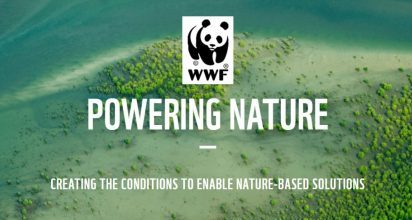WWF release Powering Nature Report on enabling Nature-based Solutions
A new report by WWF explores the barriers blocking nature’s potential and outlines a systemic enabling framework informed by wide-ranging evidence and ideas. The report calls for the unleashing of the power of nature to help solve key societal challenges at local to global scales, while maximising its positive nature-people-climate contribution. WWF is an independent […] September 9, 2021
A new report by WWF explores the barriers blocking nature’s potential and outlines a systemic enabling framework informed by wide-ranging evidence and ideas. The report calls for the unleashing of the power of nature to help solve key societal challenges at local to global scales, while maximising its positive nature-people-climate contribution.
WWF is an independent conservation organization active in nearly 100 countries that works to sustain the natural world for the benefit of people and wildlife. Their new framework, which considers the structural barriers, policy levers and systemic enablers for nature-based solutions (NbS), offers ideas and evidence on how to boost nature’s potential to tackle the greatest challenges facing our planet. The report provides governments, decision makers, civil society and the private sector with a practical basis for integrating NbS into planning decisions at different scales and in multiple sectors.
This report embraces the IUCN definition of NbS, and also embraces the published NbS guidelines for decision-makers. In particular, a key guideline is the principle that NbS are not a substitute for the necessary rapid phase-out of fossil fuels, and that private investments in high-quality NbS must happen above and beyond an a Science Based Targets initiative validated 1.5˚C aligned target, as explained in the WWF Blueprint for Corporate Leadership in Climate and Nature.
Given their importance and viability for change, the report focuses on three categories of structural barriers – sociocultural, institutional and economic. A set of policy levers are then presented that are available to decision-makers to overcome these barriers, organised around three overarching categories of systemic enablers: inclusive governance, smart planning and progressive economic and financial regulation. Together, action in these three areas represents an important step towards an integrated whole-of-government approach to social and economic policy, which is the most effective way to power NbS.
Each chapter outlines key areas where barriers and opportunities are outlined, with detailed recommendations for policy-makers, private institutions, and practitioners for each theme of transforming food systems, ecological connectivity, flood risk reduction, oceans, climate-smart approaches, indigenous peoples and local communities, finance, measuring impact, aligning policies, and international environment conventions.
The report aims to address then insufficient action by policymakers, corporate institutions and financial bodies to maximise the potential of NbS. Factors that led to the destruction of nature in the past are still obstacles to nature being part of the solution to today’s challenges. What worked in the past will no longer suffice – an urgent policy reset is needed with clear understanding of the power of nature-based solutions benefit the climate, human well-being and biodiversity.
Learn more in the report summary webpage or read the full report.
